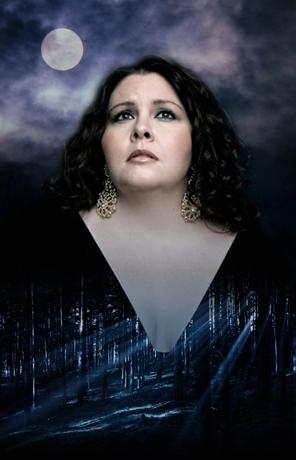‘Norma’: Meade and Zajick Lead a Druidic Triumph
By • March 14, 2013 0 2459

I’m guessing—I could be wrong here—that there’s no video game called “Druids and Romans” or “Gauls and Romans.” Ancient Britain of Gaul under the occupation of Ancient Rome is a tough task for movie makers as well as stage directors who have to cut through the thicket that is Shakespeare’s “Cymbeline.”
It’s tough for opera, too, but that’s exactly where we find ourselves in Vincenzo Bellini’s bell canto mountain of an opera, “Norma,” which has as its main characters the powerful druid high priestess Norma, her (secret) lover and father of her two children, the Roman general Pollione, the young novice priestess Adalgisa, with whom has fallen in love, and the druid Oroveso, who is also Norma’s father.
As a druid—the priest class of the ancient Celts—Norma is a high priestess of the land’s power and its magic. She interprets the will of the gods: Should the druids war against the Romans or sit back and wait? This is a paramount question during this opera, but the biggest question of all is what happens when Norma finds out that she’s essentially being dumped for a younger rival. Things do not end well, as is wont to happen in ancient Britain and in opera.
Perhaps none of that matters too much when you having the rising star soprano Angela Meade, performing and singing the role of Norma and knocking it out of the park, aided and abetted almost on an equal plane by mezzo soprano Dolora Zajick as her rival.
Meade has already done parts of the role and a concert version of “Norma,” the big rock candy mountain of bell canto singing for any star soprano worthy of the name. There have been some great Normas by all accounts, including the legendary Maria Callas. I’m guessing there’s another one that can be added to that list and her initials are A.M.
Meade is known for her technical virtuosity, something I can’t argue with. According to some critics, she isn’t yet the actress that she might be. For all the high notes—the riverboat gambling singing that is the musical equivalent of skipping a pebble on water and making it go forever—what Meade accomplishes in this role is to act with her singing. She loads her voice up not only with impossible amounts of breath and breadth and tone, but also with the most important part of the music—the singing—which is invested with the heart of Norma. This happens whether Meade is singing alone in the horrific scene where she almost “Medeas” her children (“Teneri, Teneri Figli”) or when she’s singing with Zajick in which forgiveness and sisterhood reign in a deliriously delicious duet (“Mira o Norma”, but it could be BFF).
Norma is torn—war against the Romans, revenge against Pollione—and she still has to tell her people that she is the mother of two, fathered by the Roman general.
This sort of thing is difficult to put together, because great music (yes!) or not, great singing (yes!), the action and the characters don’t exist in a vacuum. While the ladies make you care about the ladies, you have to be comfortable in the surroundings in which so much often preposterous things goes on. Director Ann Bogart and designer Neil Patel have opted for a bare-bones, bone-clean primitive look which seems somehow perpetually cold—an angled slab of stage, a wall propped up by what look like long wooden spears, an omni-present moon which the druids worship. It has just enough strangeness to make you realize just how strange that world must have been. The Romans, fixed in their legionnaire uniforms seem out of place in this environment—which seems right—while the locals range from robes to whatever the middle-class druids might wear, while vestal virgin types in shimmering white make patterns on the stage. In this group, Dmitry Belosselskiy as Oroveso resounds with authority. On the other hand, Rafael Davila has a little too much reckless petulance in his voice, but then he is playing a cad.
But as for Meade, certainly, and Zajick as well, I can only echo the gentleman behind me who voiced his pleasure at Meade’s solo and their duets with a resounding “Bravissima!”
The Washington National Opera’s “Norma” runs through March 24 at the Kennedy Center.

